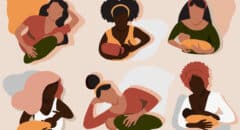
Bringing a child into the world is a joyous and transformative experience, filled with hopes, dreams, and aspirations. While the love and care for our children remain universal, certain health factors, including genetic predispositions and environmental influences, may necessitate a more nuanced approach to healthcare and well-being. Because of this, it's essential for parents, particularly those within the Black community, to be well-informed about congenital anomalies—conditions that may affect a child's development from birth. This inclusive guide aims to shed light on the different types of congenital anomalies, their signs and symptoms, and offers tailored advice for parents.
1. Structural Anomalies
Heart Defects: Black infants are more likely to be affected by certain heart defects. Watch for signs such as rapid breathing, bluish skin, or poor weight gain.
Craniofacial Anomalies: While cleft lip and palate can affect any ethnicity, being aware of these conditions is essential for all parents. Difficulty with feeding can be an early indicator.
You May Also Like
2. Chromosomal Anomalies
Down Syndrome: The prevalence of Down syndrome is similar across races. Recognizable features may include a flat facial profile and almond-shaped eyes. Timely medical support is crucial for developmental milestones.
Turner Syndrome: Short stature and delayed puberty are signs seen in girls with Turner syndrome, and early intervention is essential.
RELATED: What to Expect When Raising a Black Child with Down Syndrome
You May Also Like
3. Metabolic Anomalies
Phenylketonuria (PKU): (PKU) is a rare genetic disorder that affects the way the body processes an amino acid called phenylalanine. Amino acids are the building blocks of proteins, and phenylalanine is found in many protein-containing foods. Early detection through newborn screening is the key to preventing intellectual disabilities.
Galactosemia: Symptoms may include jaundice, poor feeding, and vomiting. Timely diagnosis and dietary management are vital.
4. Neural Tube Defects
Spina Bifida: Black children may be at a higher risk for certain neural tube defects. Look for signs such as physical deformities of the spine and issues with bowel and bladder control.
Anencephaly: Anencephaly is a severe and rare congenital anomaly that affects the development of the neural tube during pregnancy. The neural tube is a structure that eventually forms the brain and spinal cord in the developing fetus. Early identification during prenatal care is crucial.
5. Functional Anomalies
Congenital Hypothyroidism: All parents should be vigilant for signs such as lethargy and poor feeding, as early intervention is critical.
Cystic Fibrosis: Persistent respiratory infections and digestive issues may manifest, necessitating prompt medical attention.
RELATED: What Black Families Need to Know About Timely Care for Cystic Fibrosis
6. Single-Gene Disorders
Sickle Cell Anemia: This genetic disorder is more prevalent in individuals of African descent. Symptoms include fatigue, pain crises, and susceptibility to infections.
Cystic Fibrosis: Cystic fibrosis (CF) is a genetic disorder that primarily affects the lungs and digestive system. It is caused by mutations in the CFTR gene, leading to the production of thick and sticky mucus in various organs. While less common in Black populations, early recognition of respiratory symptoms is important.
7. Multifactorial Anomalies
Cleft Lip and Palate: Visible facial abnormalities and feeding difficulties are potential signs, and early intervention is key.
Congenital Heart Disease: Regular check-ups are crucial for monitoring signs such as difficulty breathing and poor feeding.
8. Developmental Anomalies
Fetal Alcohol Syndrome (FAS): While not specific to any racial or ethnic group, it's essential for all parents to be aware of the risks associated with maternal alcohol consumption during pregnancy.
Advice for Black Parents
- Cultural Competence: Seek healthcare providers who understand and respect cultural nuances, ensuring effective communication and personalized care.
- Advocacy: Be proactive in advocating for your child's health. Understand the importance of regular check-ups and screenings.
- Community Support: Connect with community resources, support groups, and organizations that focus on the unique needs and experiences of Black families facing congenital anomalies.
Remember, as Black parents, your unique experiences and cultural considerations are invaluable in navigating the complexities of congenital anomalies. Being informed, engaged, and connected with healthcare professionals can empower you to provide the best possible care for your child.








